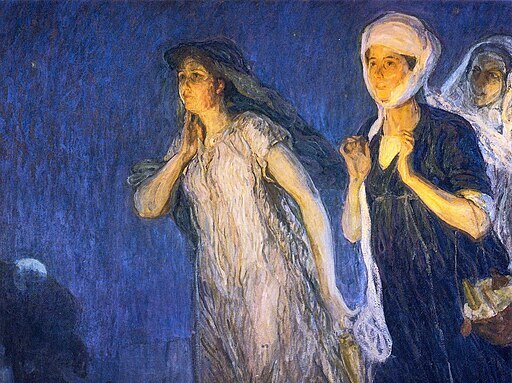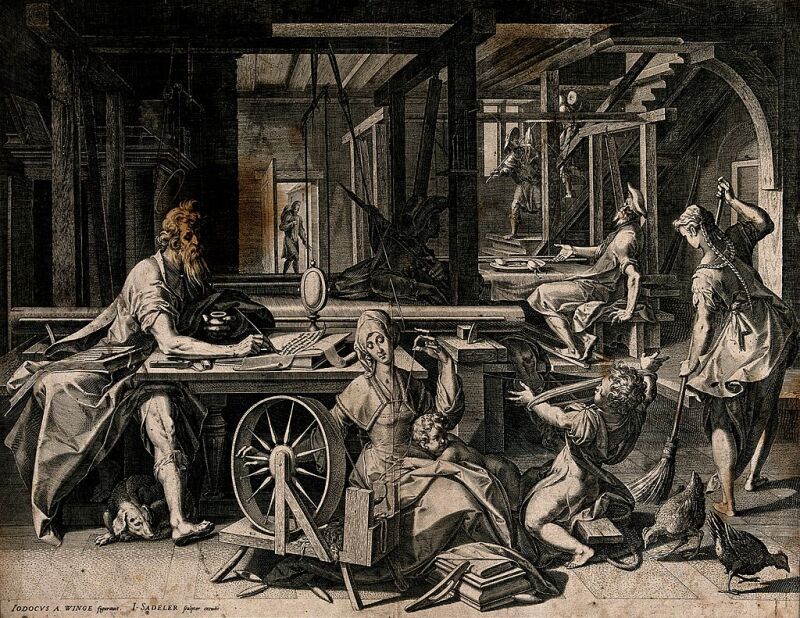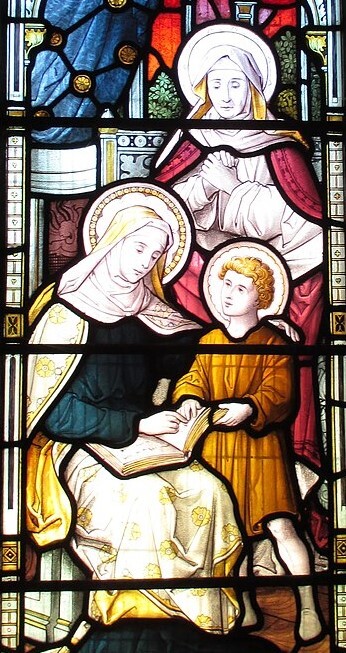
When we think of faithful New Testament women our first thoughts probably go to Mary the mother of Jesus, or to Mary Magdalene the first human witness of the resurrected Savior. While these two Marys are stalwart disciples, we can also find inspiring examples in the women converted soon after Jesus Christ’s Resurrection, women who were essential to the growth of the early Christian church.
Many of these women were well known in their communities; they heard Paul preach in the synagogues, by rivers, and in busy city centers (Acts 16:13; 17:10,16,17). A mix of Jews and Gentiles, they were powerful witnesses of Jesus Christ whose devotion can deepen our own discipleship. As we study the final Pauline epistles in Come, Follow Me, we can find great value by reflecting on their contribution.
In an informal social media survey of 254 church members, 99% said they knew something significant about Mary Magdalene, only 4% knew something significant about Damaris, and only 1% something about Euodia. This is not surprising given that the information about these women is often sparse. In this article, we will explore the examples of early Christian women who exemplify deep consecration, commitment, and conviction to Jesus Christ. (Note: In this article, scripture references come from the King James Version, KJV unless otherwise indicated.)
Consecration
First, the early Christian women lived lives of consecration. Phebe offered her kindness and service (Romans 16:1–2), the four daughters of Phillip shared their spiritual gifts (Acts 21:8–9), and Priscilla devoted her life to building the church (Acts 18:2–3).
Phebe is the only person for whom Paul tells the Saints to, “give her any help she may need.” (Romans 16:1, 2 New International Version (NIV)). To give that open directive, Paul must have known her well and had confidence in her. Paul writes that Phebe helped many of the saints including himself. Paul puts his stamp of approval on the work she is doing and is appreciative of it. He describes Phebe as a servant of the church, (Romans 16:2) focusing on her significant effort to build the kingdom.
The four daughters of Philip may not be well known to us, but they are known in Caesarea for their spiritual gift of prophecy (Acts 21:8, 9). Joseph Smith taught, “No man can be a minister of Jesus Christ except he has the testimony of Jesus; and this is the spirit of prophecy” (Teachings of Joseph Smith, 193) Elder James E. Talmage wrote, “No special ordination in the Priesthood is essential to man’s receiving the gift of prophecy…this gift may be possessed by women also” (Articles of Faith, 228–229). Perhaps the four unmarried daughters of Philip are boldly sharing their testimonies of Jesus Christ, or perhaps they are prophesying the future, or both. Whichever it is, they are known for their spiritual gift.
It appears from the moment Priscilla first encountered the Apostle Paul that she lived a life of consecration, devoting her life to the Lord. “Because [Paul] was of the same craft he abode with them … and continued there a year and six months, teaching the word of God among them” (Acts 18:2, 11).

Priscilla likely took advantage of the 18 months hosting Paul to learn doctrine; this became apparent later in Ephesus. When Paul traveled to Ephesus for more missionary opportunities, Priscilla and her husband Aquila came with him. After Paul departed, a talented preacher named Apollos came to Ephesus but he did not have all his facts straight. “When Priscilla and Aquila heard him, they took him aside and explained the Way of God to him more accurately” (Acts 18:26). Priscilla and Aquila corrected false teaching and did so appropriately and graciously.
Being willing to put their life on the line for Paul showed their dedication to the cause. Paul wrote, “Greet Prisca [Priscilla] and Aquila, who work with me in Christ Jesus, and who risked their necks for my life, to whom not only I give thanks, but also all the churches of the Gentiles” (Romans 16:3–5).
The phrase “all the churches of the Gentiles” (my emphasis) is comprehensive! It implies Priscilla and Aquila must have served the many surrounding church congregations in significant ways since they all felt appreciative towards this missionary couple. Not surprisingly, Priscilla and Aquila also hosted church gatherings at their house (Romans 16:3–5).
When women and men today allow the Lord to use their talents and abilities even when it stretches them, they show devotion to Jesus and his message. Sister Michelle Craig taught, “I am learning that Heavenly Father is more interested in my growth as a disciple of Jesus Christ than He is about my comfort.”
Commitment
The early Christian women displayed a total commitment to Jesus Christ, as we see with Damaris (Acts 17:34), Lois and Eunice (2 Timothy 1:5), and Rufus’ mother (Romans 16:13).
Damaris, in Athens, is a prime example of commitment. She chose to listen to a servant of God, not common culture. When Paul preached to her of a living God and taught that we are His offspring, Damaris believed his preaching even though it differed greatly from the many unapproachable Greek gods in her city and culture (Acts 17:23–27). “Certain men clave unto [Paul], and believed…and a woman named Damaris, and others with them” (Acts 17:34).
Lois and Eunice’s commitment was seen in their own home. When his mission companion Timothy needed encouragement, Paul reminded him of the faith of his grandmother Lois and mother Eunice. He wrote, “When I call to remembrance the unfeigned faith that is in thee, which dwelt first in thy grandmother Lois, and thy mother Eunice; and I am persuaded is in thee also” (2 Timothy 1:5).

Either Paul worked with Lois and Eunice in Lystra when he first met Timothy, or he knew enough of their reputation to point Timothy to their profound faith. He teaches Timothy to continue in what he has learned, “knowing of whom thou hast learned them; and that from a child that has known…” (2 Timothy 3:14–15). Timothy’s father was a Greek which may imply he had not converted to this new sect of Christians; suggesting that his grandmother Lois and his mother Eunice were the main gospel teachers in his home.
Often, our commitment to a cause is demonstrated in a willingness to serve, even outside of our families. Paul traveled, preached, and seemed to be always on the go. Not surprisingly he appreciated the service rendered by Rufus’ mother towards himself and other Saints, “Greet Rufus… and his mother, who has been a mother to me too” (Romans 16:13 NIV).
Like they did anciently, today women with and/or without children of their own, who are mother figures to others, make a profound difference in their own family life and outside of their family.
As Elder Bednar taught, “Brothers and sisters … [who] consistently strive to ‘comfort those that stand in need of comfort,’ without expectation of acknowledgement or praise,” are devoted disciples of Jesus Christ and are the strength of the Church.
Conviction
A third lesson we can learn from the early Christian women is that they lived with conviction as seen in those who chose to believe even when persecution raged around them. Despite the Jewish rulers doing all they could to stop the work in Jerusalem, miraculously, the numbers of the church increased dramatically “both men and women,” (Acts 5:14). This was also true for the areas outside of Jerusalem, like Samaria. After the ascension, when Phillip traveled to Samaria, “both men and women” were baptized there (Acts 8:12).
Our level of conviction can be shown in what we are willing to put our energy into. Paul described Tryphena, Tryphosa, and Persis who work hard for the Lord (Romans 16:12, New Living Translation, NLT), and Mary of Rome who “worked very hard for you” (Romans 16:6, NIV). Paul wanted his fellow Saints to know that these women believers were working hard for them and for the Lord.
Working hard for the Lord in some cases included opening homes for church gatherings, including all that hosting entails. Specifically, at least six women were lauded for opening their home: Mary the mother of John Mark in Acts 12:12; Lydia in Acts 16:40; Chloe in 1 Corinthians 1:11; Priscilla in 1 Corinthians 16:19; Apphia in Philemon 1:2 (NIV); Nympha in Colossians 4:15 (NIV).

Lydia, the first Christian convert in the area we now know as Greece, demonstrated her deep conviction initially with her humility in accepting Paul’s testimony as truth and then by sharing her financial resources and leadership with the church. She listened to Paul by the river where women had gathered for prayer. Her whole household was converted, and she welcomed Paul and the believers to her home. She was a woman of means and she used those means to build the church. She was humble enough to allow the Lord to open her heart and brave enough to open her home for gathering and strengthening saints (Acts 16:12–15, 40).
Living a life of discipleship frequently meant working alongside other brothers and sisters in the church. In Paul’s words, Euodia and Syntyche worked hard “at my side” (Philippians 4:3 NIV). What did Euodia and Syntyche do as they worked alongside of an apostle and missionary? They likely strengthened new converts, taught, ministered, spread the good news of the gospel, and served however it was needed. Paul writes that Euodia and Syntyche’s names are in the book of life, a strong endorsement of the important work they did (Philippians 4:3).
In the present day we may open our homes when we welcome our ministering brothers or sisters, or by having youth over for a wholesome activity. We work alongside other Saints when we contribute to council meetings and serve side by side. We work hard for the Lord as we focus on Jesus Christ and do His work. President Camille Johnson taught, “We can partner with the Savior to help provide temporal and spiritual relief for those in need.”
In Berea where many men and women believed Paul’s words, they “received the message with eagerness and examined the scriptures daily to see if what Paul said was true” (Acts 17: 10-12, NIV). This is one of very few places in scripture where the people are specifically noted as searching the scriptures daily.
President Nelson taught how essential being in the scriptures daily is when he said, “With frightening speed, a testimony that is not nourished daily “by the good word of God” can crumble. Thus, the antidote to Satan’s scheme is clear: we need daily experiences worshiping the Lord and studying His gospel.”
While we may wish we had more information on each group of women converts and each individual sister, we can get a glimpse into the devoted discipleship of the early Christian female Saints. The newly baptized members’ belief in Jesus Christ compelled them to minister and share their witness. Clearly, everywhere the gospel message went, women were a vital part of it.
Perhaps we can discuss the contributions of these faithful early Christian women more than we do. When we think of Priscilla, we could ask ourselves, “Does my belief in Jesus Christ motivate my devotion to the Lord? or Phebe, “Am I a servant of the church?” or Tryphena, Tryphosa, and Persis, “Do I work hard for the Lord?” or Lydia, “Has the Lord opened my heart?” or Lois and Eunice, “Am I passing on my faith to my children and/or grandchildren?” or the four daughters of Phillip, “Do I share my spiritual gifts in a way that blesses others?” or Damaris, “Do I listen to the servant of God, not common culture?”
When we remember the love and compassion they possessed, the work they engaged in, the fearless faith they fostered, the tenderness they exhibited, and the joy they experienced, we find in them inspiration to be valiant in our testimonies of Jesus Christ.
▶ You may also like: Did you know there’s a journal edition of this year’s ‘Come, Follow Me’ manual?


